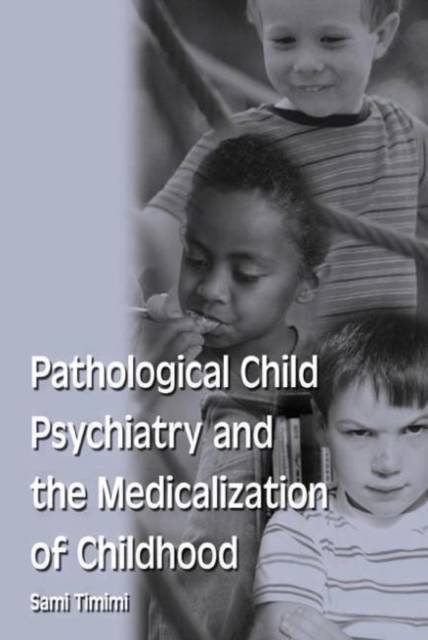
Je cadeautjes zeker op tijd in huis hebben voor de feestdagen? Kom langs in onze winkels en vind het perfecte geschenk!
- Afhalen na 1 uur in een winkel met voorraad
- Gratis thuislevering in België vanaf € 30
- Ruim aanbod met 7 miljoen producten
Je cadeautjes zeker op tijd in huis hebben voor de feestdagen? Kom langs in onze winkels en vind het perfecte geschenk!
- Afhalen na 1 uur in een winkel met voorraad
- Gratis thuislevering in België vanaf € 30
- Ruim aanbod met 7 miljoen producten
Zoeken
€ 79,45
+ 158 punten
Uitvoering
Omschrijving
Currently, it is common practice among the child psychiatric establishment to prescribe powerful and potentially addictive drugs to children who have emotional or behavioural problems. Pathological Child Psychiatry and the Medicalization of Childhood is a strong challenge to this way of thinking.
Sami Timimi uses a wide variety of sources that shape our understanding including his personal experiences to highlight the role of culture, beliefs, science, social hierarchy and power, in shaping our understanding of childhood problems and how to deal with them. He urges professionals who work with children to question their assumptions in a manner that will enable them to access a greater variety of potentially helpful therapeutic frameworks.
Since the 1960s, psychiatry has had to learn to accommodate critical analysis of its beliefs and methods. The legitimacy of its core assumptions continues to be questioned. Now child psychiatry too must engage with such a debate, if it wishes to develop into a genuinely democratic and inclusive profession. Pathological Child Psychiatry and the Medicalization of Childhood will be of great interest to professionals and trainees in psychiatry and child psychiatry, social work, family therapy and other psychotherapies for children and adolescents.
Sami Timimi uses a wide variety of sources that shape our understanding including his personal experiences to highlight the role of culture, beliefs, science, social hierarchy and power, in shaping our understanding of childhood problems and how to deal with them. He urges professionals who work with children to question their assumptions in a manner that will enable them to access a greater variety of potentially helpful therapeutic frameworks.
Since the 1960s, psychiatry has had to learn to accommodate critical analysis of its beliefs and methods. The legitimacy of its core assumptions continues to be questioned. Now child psychiatry too must engage with such a debate, if it wishes to develop into a genuinely democratic and inclusive profession. Pathological Child Psychiatry and the Medicalization of Childhood will be of great interest to professionals and trainees in psychiatry and child psychiatry, social work, family therapy and other psychotherapies for children and adolescents.
Specificaties
Betrokkenen
- Auteur(s):
- Uitgeverij:
Inhoud
- Aantal bladzijden:
- 200
- Taal:
- Engels
Eigenschappen
- Productcode (EAN):
- 9781583912164
- Verschijningsdatum:
- 18/07/2002
- Uitvoering:
- Paperback
- Formaat:
- Trade paperback (VS)
- Afmetingen:
- 155 mm x 231 mm
- Gewicht:
- 312 g

Alleen bij Standaard Boekhandel
+ 158 punten op je klantenkaart van Standaard Boekhandel
Beoordelingen
We publiceren alleen reviews die voldoen aan de voorwaarden voor reviews. Bekijk onze voorwaarden voor reviews.









